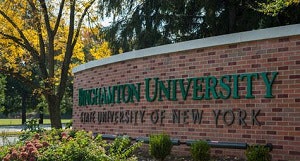Binghamton University president Dr. Harvey G. Stenger recently announced new initiatives to confront racial inequities in the wake of national anti-racist protests. But the reforms, which come after years of tension between university leadership and student activists, have sparked varied reactions from the campus community.
Stenger promised that the State of New York (SUNY) campus would set aside $1.5 million in endowment funds to establish the George Floyd Scholarship for Social Change, which will go toward supports for minority students. Starting in the next academic year, selected students will receive at least $5,000 annually for up to three years. Plus, the university will increase its annual investment in the Clifford D. Clark Diversity Fellowships program for graduate students by $200,000.
To reform campus policing, the university will form a Campus Citizens Review Board for students, faculty and staff to give feedback on the Binghamton University police department’s budget, policies and procedures. And effective immediately, campus police will be subject to policy and procedure recommendations put forth by the National Association for the Advancement of Colored People (NAACP).
Stenger also threw his support behind New York Gov. Andrew Cuomo’s Say their Name Reform Agenda, now signed into law, which includes banning chokeholds, releasing prior police disciplinary records and allowing the attorney general to serve as an independent prosecutor in all civilian deaths by police. Campus police will be subject to these policies as well.
The deaths of George Floyd, Ahmaud Arbery and Breonna Taylor “are only the most recent in a long history of violence against Black Americans and have caused our cultural community a great deal of pain,” Stenger wrote in a June 10 statement. “As a premier educational institution, our goal must be to make our campus a place where everyone feels that they belong and supported in their efforts to excel.”
The announcement was met with some skepticism in the form of open letters from faculty and students, calling for a reckoning with the past and more active plans for the future.
One open letter – signed by more than 150 faculty, students, student groups and alumni – called for diversity training for all staff, more faculty of color and a mandatory curriculum on the history of Black and Latinx communities.




















